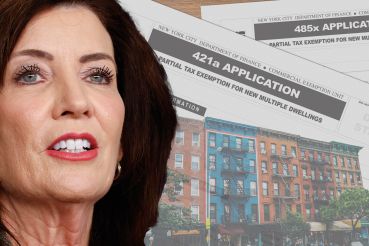Greenberg Traurig’s Robert Ivanhoe on Cherryland and Chesterfield, Two Cases New Yorkers Might Be Hearing a Lot Of
By Jotham Sederstrom August 9, 2012 7:15 am
reprintsAs chair of law firm Greenberg Traurig’s global real estate practice and its New York office, veteran attorney Robert Ivanhoe has, for more than 30 years, represented most of the city’s heaviest real estate hitters. In order to protect his biggest clients, Mr. Ivanhoe follows precedent-setting cases from across the country. Among the cases he’s now watching are two in Michigan—Cherryland and Chesterfield—that challenge the very essence of non-recourse loans. Last week, Mr. Ivanhoe discussed the implication of both cases with The Commercial Observer.

The Commercial Observer: If you had to name one legal decision that has major implications for New York City real estate owners in the near future, what would it be?
Mr. Ivanhoe: I actually have two cases. One case is called Cherryland and the other is called Chesterfield. They’re both Michigan cases. One is a state court case, the other is a federal case. They’re Michigan cases, but they have—they might have—enormous implications on the ability to finance real estate.
Take me from the beginning.
So in a typical loan, especially in a CMBS [commercial mortgage-backed security] loan that gets securitized, there were always sort of guidelines as to the way a loan would be structured. And one of the fundamentals of how it was structured is [that] you would have a single purpose entity borrower—so your borrower only owned the real estate that was being mortgaged and didn’t have any other assets. And they would have to operate in a certain way that a single purpose entity would operate. And if they did those things, then the loan would be non-recourse to the principals of the borrower unless the principals of the borrower did certain things that people called “bad boy” acts, like committing fraud.
So how are these cases in Michigan different?
So, in these two Michigan cases, contrary to what every real estate lawyer anywhere in the country would say the documents say, the courts allowed the foreclosing lenders, which were both special servicers, to go after the borrower for a deficiency judgment where the lender foreclosed only, simply, for monetary default. Contrary to what every lawyer would say the documents say and what the intent was, the courts found that the lenders could personally sue the borrowers because the mere default breached these covenants that were in the documents.
Does that set a legal precedent here in New York?
Well, what it could mean is, if that gets spread around the country—if those cases get spread around the country, which hopefully they won’t—every borrower could be personally liable for every loan instead of… Put simply, the whole concept of non-recourse borrowing goes away. It’ll change people’s appetite for buying real estate.


